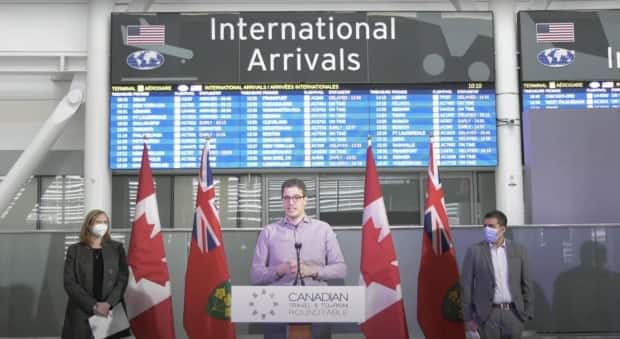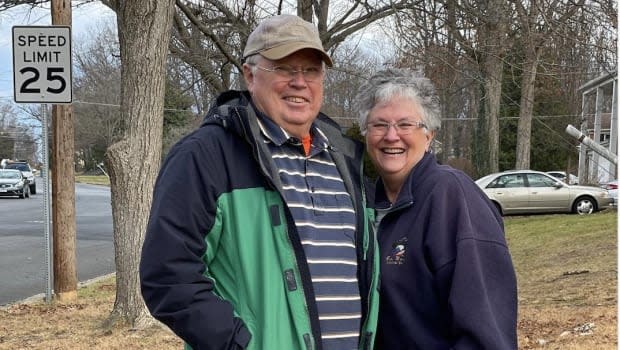Ottawa close to removing pre-arrival COVID-19 test for fully vaccinated Canadian travellers: sources

The federal government is close to removing mandatory PCR testing for fully vaccinated Canadians who travel outside Canada, sources tell CBC News.
Currently any person who travels outside the country must provide proof of a negative molecular test (such as a PCR test) prior to returning home. The test must be taken within 72 hours of scheduled departure on a flight or arrival at a land border.
At a news conference on Friday, Health Minister Jean-Yves Duclos hinted at revisions coming to Canada's travel rules. "Our government is actively reviewing the measures in place at our borders, and we should be able to communicate changes on this next week," he said.
The news comes one day after two infectious diseases physicians joined forces with the travel industry to call for an end to Canada's pre- and post-arrival testing requirements for fully vaccinated travellers.

At a news conference held at Toronto's Pearson International Airport on Thursday, Dr. Dominik Mertz and Dr. Zain Chagla — along with the Tourism Industry Association of Canada — argued that testing travellers is pointless, because Omicron has already spread across the country.
"The risk for the average traveller coming in is in the same ballpark as if you were testing a random person in downtown Toronto. It's not going to make a difference," said Mertz, an infectious diseases specialist with McMaster University in Hamilton.
High cost of travel rules
Travellers entering Canada must pay for their pre-arrival molecular test, which can cost upward of $100.
The government is also spending millions of dollars to randomly test thousands of vaccinated travellers daily upon arrival.
At the news conference, Chagla argued the money spent on tests by both the government and individuals is a wasted expense.
"There is something to be said about the cost here, both for the individuals but [also] for the public for testing that may not … be preventing a lot of people from spreading COVID-19 locally," said Chagla, an associate professor at McMaster University.
WATCH | There are better ways to look for Omicron than testing travellers, specialist says:
Jeannette Smith, of Porters Lake, N.S., feels the $300 US she spent on two PCR tests to return to Canada was a waste of money. Smith and her husband drove to Fairfax, Va., in December to visit their daughter.
The couple paid for expedited PCR tests in Fairfax. The results were supposed to arrive within two days, but, due to high demand, they didn't arrive in time.
Smith said the couple decided to cross the border anyway, because a snowstorm was coming and they feared it would lead to highway closures.

They didn't get fined, she said, but a Health Canada official at the border noted on their files that they entered the country without a test.
"We're really concerned about when we cross the next time," said Smith. "Here we are, doing everything that we're supposed to do, following all the rules to the letter, and it still didn't work out."
Smith and her husband finally did get their negative test results — after they arrived home. She said she supports Canada's COVID-19 measures, but believes the time has come to relax the rules for fully vaccinated travellers.
"We're getting to the point with the pandemic that more and more people are vaccinated and [we should] allow a little more freedom for those people."
Positivity rate climbs
During Friday's news conference, Chief Public Health Officer Dr. Theresa Tam noted that the positivity rate for travellers tested upon arrival has climbed over the past couple of months due to the highly infectious Omicron variant.
Between Sept. 10 and Nov. 27, just 0.16 per cent of randomly selected fully vaccinated travellers tested positive upon arrival. But that number jumped to 5.16 per cent between Nov. 28 and Jan. 22, according to the latest data.
"Each one of these individuals can potentially transmit to others," said Tam.
WATCH | Pandemic travel restrictions are under review, public health officials say:
Even so, she said, it's time to review Canada's border measures.
"We do have to adapt our border stance, because we know it's pretty impossible to reduce every single case of importation. It's already in Canada and it's transmitted widely throughout our communities."
Other health experts generally agree, but with caveats
CBC News asked 10 other medical professionals their opinions on dropping testing requirements for travellers. In general, they supported nixing the current testing rules for fully vaccinated travellers, but some listed caveats.
Several recommended that travellers take a pre-arrival antigen test instead of a molecular test. Although PCR tests can be more accurate, antigen tests are much cheaper and can provide results within minutes.
"The other passengers and the people who are working on that flight should not have to be on a flight with someone who is positive," said Tara Moriarty, an infectious disease researcher and associate professor at the University of Toronto.
"Rapid tests are probably a better way to go and then that's also something that can be done at the airport."
WATCH | Some Canadians reconsidering international travel over March break:
Dr. Prabhat Jha, an epidemiologist at St. Michael's hospital in Toronto, also recommended switching to antigen tests, and suggested the government change the definition of 'fully vaccinated' to those who have also had their booster shot.
Montreal epidemiologist and cardiologist Dr. Christopher Labos cautioned that if Canada dropped all test requirements, it would need to have a solid plan in place to quickly redeploy them if necessary.
When it comes to arrival testing, Moriarty said she would like the government to still do surveillance testing of some travellers, but without requiring them to quarantine while they wait for their test results.
"All the resources that are put into this would be far better deployed into surveillance … so that we have some eyes on what might be coming in terms of variants."

 Yahoo Finance
Yahoo Finance 